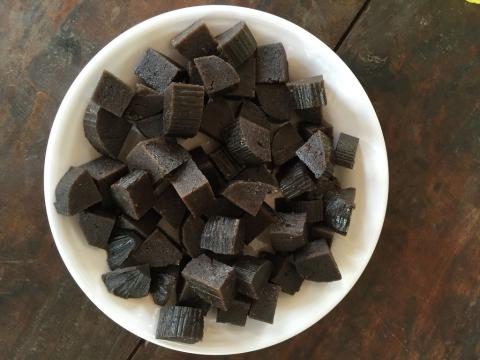Dodol is a staple rice-based delicacy among our Maranaoan brothers and sisters. It is given as a special gift or as pasalubong.
Dodol is a Maranao delicacy which is made from sticky rice, coconut milk and sugar. It has become a popular Iftar food aside from being served during celebrations like wedding and thanksgiving. I am writing this blog in time when Ramadan is about to start.
Dodol is definitely one of the rice-based delicacies that need consistent stirring---the stickier it gets, the better. It would take several hours of cooking and stirring to get the right consistency. Upon tasting the final product, the mixture won’t be too sticky; only thick, rich and sweet. When I first came across this delightful treat, I find it a bit oily and very filling. I had no idea it is a gastronomical offering by our Muslim brothers and sisters.
As a finished product, Maranaos tend to serve Dodol wrapped in Mamaan leaves (a corn husk-like leaves) or colorful cellophanes for good presentation.
The following ingredients are used to make *Dodol with serving suggestions for 12 to 15 persons:
3 kilos of glutinous rice flour (consisting of 1 kilo regular rice, 1 kilo purple or tapol rice and 1 kilo sticky rice)
Coconut milk from 15 pieces coconuts (the more coconuts, the better)
3 kilos brown sugar (1:1 ratio with rice)
1 bowl mashed durian flesh (optional for added variety and flavouring)
Procedure:
1. In a big kawali or kalha (wok), gradually heat and boil the coconut milk over medium flame. When oil surfaces, add the 3 kilos brown sugar.
2. Add glutinous rice gradually and stir occasionally to avoid the mixture from clumping and scorching.
3. Stir the mixture until it thickens.
4. When the mixture thickens, add the mashed durian flesh if desired.
5. Set flame to low and stir the mixture continuously. Do such until the mixture thickens and turns glossy.
6. Set aside to cool down and slice it according to size preference.
*Dodol recipe provided by Moksinoor Makatuon with Normidah Mapandi, Normila Makabangon, and Derumbai Mapandi of Bigmiladok, Tangkal, Lanao del Norte.

